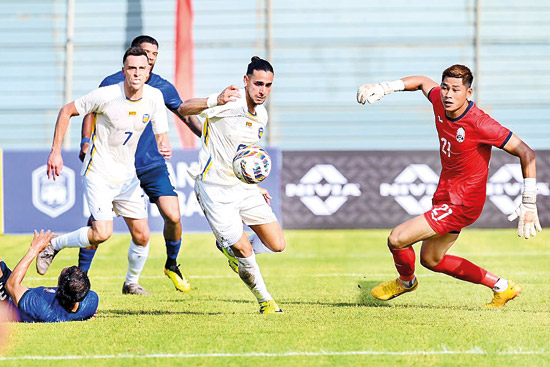FSL to resume domestic competitions sooner than later
Sri Lanka’s football team has demonstrated significant improvement, becoming a formidable opponent for their rivals. The team’s progress, starting with a 3-0 loss to Yemen on October 12, 2023, and culminating in a gripping scoreless draw against Cambodia last Thursday, is a promising development for a nation that has been without domestic tournaments for the past two years.
The team’s successes are largely attributed to the contributions of professional players based abroad, whose varying levels of skill have enhanced the squad’s performance. However, the long hiatus of domestic competitions—over two years without a single tournament—has led to concerns about sustaining this upward trend.

Sri Lanka's recent success at international games, has helped football's image
“There were many factors contributing to the lack of domestic competitions in Sri Lanka. With the national team’s progress over the past year, many questioned why we had not resumed domestic leagues. We had our reasons for the delay, but Football Sri Lanka (FSL) is committed to resuming our core domestic competitions, starting next month, and they will be bigger and better,” assured FSL President Jaswar Umar.
Administrative challenges, election delays, and a global ban have disrupted the annual club competitions previously organised by FSL. However, Umar has confirmed that the Super League and Champion League will return at the end of October.
The prolonged absence of competitions has created difficulties for football stakeholders, including clubs, players, and other contributors. A break of this length can disrupt a top club’s structure, reduce sponsorship opportunities, and make it harder to retain players. With the domestic football scene on hiatus for over two years, many teams faced severe financial difficulties, raising doubts about their potential comeback.
“While the teams were not fully prepared for the restart, public enthusiasm for the national team’s progress was high. Domestic clubs that had invested heavily faced numerous challenges, but they were eager to revive football. It’s a fresh challenge for FSL, clubs, and all stakeholders. We are rebuilding from scratch, and things are starting to align,” Umar added.
The Super League, featuring 10 teams, is set to run for six months starting at the end of October. This will be followed by the Champion League, with 14 teams competing over four months.
In addition to these premier competitions, FSL is also focusing on youth and women’s football. Competitions for both genders in the Under-19 and Under-16 categories are scheduled to start in early November, with over 25,000 players participating across more than 55 cities island-wide. FSL will also continue other projects such as coach education, grassroots development, refereeing, and a separate programme for administrators in November.
“When we took over FSL, we faced a daunting task. It was a challenging situation, but we had to start somewhere, and that was with the national team. Their recent performances have garnered significant interest and a positive image for FSL. This has been beneficial in generating enthusiasm for football among Sri Lankans and attracting potential commercial partners,” Umar emphasised.
Under the leadership of Sujan Perera, Sri Lanka has played seven international matches since October 12, 2023, achieving one win, three draws, and three losses. After a 3-0 defeat to Yemen, Sri Lanka drew 1-1 with them a week later under coach Andy Morrison. On March 22, they drew 0-0 with Papua New Guinea in Colombo, followed by a 2-0 victory against Bhutan on March 25. The team lost both friendlies against Brunei with scores of 0-1 on June 8 and 11. Most recently, under interim coach Abdullah Al Mutairi, Sri Lanka secured a scoreless draw against Cambodia on Thursday, with the second leg of the AFC Asian Cup Qualifier scheduled for Tuesday in Phnom Penh.
“I promised a change, and although we did not secure a win, we played according to our plans. I am confident we will bring the energy needed to deliver a victory for all Sri Lankans on Tuesday,” promised Al Mutairi, who has also begun sharing his expertise with local coaches.
FSL plans to integrate potential players into the national squad through the usual selection process, allowing them to collaborate with professionals from foreign leagues. The resumption of domestic competitions, combined with the national team’s successes, will push local players to evolve from amateur to professional, which is crucial for Sri Lanka’s continued advancement on the international stage.


